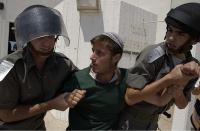-
Mighty Saber demonstrates post-nuclear detonation technical forensics capabilities
In late 2013, a team of more than fifty scientists from across the U.S. laboratory and industrial complex began preparing for Mighty Saber with the goal of demonstrating and evaluating post-detonation technical nuclear forensics capabilities following a simulated detonation of a nuclear device in an urban environment. Mighty Saber, which ran from 27 July to 21 August 2015, successfully met each of its objectives, including demonstrating U.S. government post- detonation nuclear forensics processes; the value of prompt diagnostics data provided by the Discreet Oculus ground-based sensor network; and how prompt diagnostics complements radiochemistry in providing a robust post-detonation nuclear forensics capability.
-
-
Determining the age of fingerprints
Watch the imprint of a tire track in soft mud, and it will slowly blur, the ridges of the pattern gradually flowing into the valleys. Researchers have tested the theory that a similar effect could be used to give forensic scientists something they’ve long wished for: A way to date fingerprints. Even the approximate age of a fingerprint can have a critical bearing on forensic results, as it can rule out some prints as being too old to be relevant to a crime scene. Military forensics experts would like to be able to date the multitude of fingerprints found on improvised bombs used by insurgents to winnow out prints of individuals who may simply have handled the components in a shop from those of the actual bombmakers.
-
-
Case closed: French judges end Yasser Arafat murder-by-radioactive-poisoning inquiry
French judges who were investigating charges by the Palestinian Authority and the widow of Yasser Arafat that he was murdered by being poisoned with radioactive material, have closed the case without bringing any charges. Arafat died in November 2004, aged 75, in Percy military hospital near Paris after developing stomach pains and exhibiting symptoms of a more general deterioration while living under Israeli siege at his partially destroyed headquarters in Ramallah. In 2012 a team of Swiss scientists found elevated levels of polonium-210 and lead-210 in tissue samples taken from his exhumed body, but French and Russian scientists who examined the same tissue samples did not find abnormal radiation levels and dismissed the Swiss findings as resulting from methodological errors.
-
-
Lost generation: Wars prevent 13m children in Middle East, north Africa from going to school
The UN children’s fund, in a report issued earlier today (Thursday) said that conflicts across the Middle East and North Africa have been preventing more than thirteen million children from attending school, undermining their hopes for a better future. “We’re on the verge of losing an entire generation of children in the Middle East and North Africa,” UNICEF regional director said.
-
-
More minorities join the sovereign citizen movement

The sovereign citizen movement, the roots of which lie in white separatism and anti-Semitism, now welcomes non-white adherents. Especially susceptible to recruitment efforts by the movement are African Americans – called “Moorish Americans” or “Moorish Natives” by movement members – from poor and neglected neighborhoods.“They are much more reflective of the demographics of society today,” a former FBI case manager notes.
-
-
Terrorist attacks involving firearms cause more fatalities than attacks using explosives
New background report examines use of firearms in terrorist attacks. The report finds that even though the use of explosives has the potential to cause exceptionally high numbers of casualties, in general, attacks involving firearms were more likely to be lethal.
-
-
Members of right-wing militia go to jail for plotting attacks on U.S. infrastructure
Three members of a right-wing militia have been sentenced to twelve years in prison for conspiring to use weapons of mass destruction in attacks against federal government agencies. The defendants planned to attack critical infrastructure in Georgia while motivating militia groups in other states to rise up and join them in removing government officials who they believed had exceeded their Constitutional power. The militia members planned on starting a revolution against the federal government by conducting an attack aimed at the infrastructure supporting the TSA, DHS, and FEMA.
-
-
Chad executes 10 Boko Haram members
Chad said it has executed ten members of Boko Haram by firing squad, marking the first use of the death penalty since 2003. The ten men were sentenced to death on Friday after a court convicted them of crimes which included murder and the use of explosives. Chad officials said that one of those executed was Bahna Fanaye, alias Mahamat Moustapha, described by the Chadian officials as a leader of the Nigeria-based group.
-
-
Questions raised about Provisional IRA’s possible return to its violent ways
It has been assumed that Provisional Irish Republican Army (PIRA) has “gone away,” in the words of Sinn Féin’s leader Gerry Adams. In the wake of the 13 August killing in Belfast of a former IRA operative, police north of south of the border have launched an investigation into whether PIRA is still engaged in violence. Separately, a former member of PIRA, who is now a historian working in theBoston College Belfast Project, has charged that hackers affiliated with Sinn Féin have hacked his and his wife’s communication and leaked some of it to the press. U.S. courts allowed the Northern Ireland police access to portions of the archive, leading to arrests of several prominent Belfast Republicans.
-
-
Palestinians to pay $10M to terror victims while appealing $218.5M verdict
The Palestinian Authority and the PLO, found liable in a lawsuit over Americans killed in terrorist attacks, must pay $10 million in cash and an additional $1 million monthly payment while the case is on appeal, a U.S. judge ruled on Monday. A jury awarded $218.5 million in damages earlier this year in a lawsuit brought by victims and survivors of bombings and shootings by Palestinian terrorists in Israel from 2002 to 2004. The damages were automatically tripled, to $655.50 million, by the U.S. Anti-Terrorism Act.
-
-
Thwarted train attack in France highlights U.S. rail vulnerability
Airports are protected by several layers of security, but railroad stations have minimal, if any, protective measures, and there are no security checks through which those who take the train must pass. The attempted attack on the high-speed train from Brussels to Paris, an attack foiled by the quick courageous action of three Americans and Briton, only highlights the vulnerability to attack of U.S. rail. Security experts say, however, that trains remain vulnerable to terrorist attacks. A recent study, which analyzed terrorist attacks over a 30-year period from 1982 to 2011, found that terrorists have shifted their focus in recent years away from attacking airlines to attacking subway and rail systems. The deadliest attacks in the decade 2002-2011 were against subway and commuter rail systems.
-
-
Agroterrorism a serious risk to Americans, U.S. economy: Experts
The word “terrorism” is typically associated with bomb and bullets, but security experts say that there are other types of terrorism which may bring death and disruption, chief among them is agroterrorism. Agroterrorism is the use of animal or plant pathogens to disrupt a nation’s food supply, or use the food supply to spread deadly disease.In 2004, Tommy Thompson, then secretary of Health and Human Services, said that, “For the life of me, I cannot understand why the terrorists have not attacked our food supply, because it is so easy to do.”
-
-
Israel places Jewish extremists in administrative detention for six months without charge

Israel has expanded its crackdown on Jewish terrorists and their supporters, placing two high-profile extremists in administrative detention for six months – that is, jailing them for six months without charge — and arrested more than a dozen other extremists in West Bank settlement. About two dozen extremists from different West Bank settlements were taken into police stations and their finger prints, DNA, and other identifying markers collected before they were released. They are suspected of being part of the extremist movement, and if they take part in violent actions against Palestinians it would easier for forensic experts to determine whether or not they were on the scene. Following the 31 July arson attack by extremist settlers on a Palestinian family in the village of Duma – the extremists blocked the doors to the house from the outside to make sure the family of four would burn alive – the Israeli government voted to designate Jewish settlers’ violence as terrorism, allowing the security services and police to take steps to combat the extremists which would otherwise not be permitted.
-
-
D.C. security gaps exposed by gyrocopter landing on Capitol grounds: Senate panel
A Senate committee has concluded that the Florida man who flew a one-man gyrocopter and landed it on the U.S. Capitol grounds, had exposed security gaps and inadequate coordination among the agencies charged with protecting the Capitol, the White House, and other Washington landmarks. In addition to calling for better coordination among the different agencies responsible for securing important sites in Washington, D.C., the committee strongly recommends seeking new “technological solutions” to spot similar flights in the future, suggesting that Congress should also consider increasing penalties for those who breach the restricted airspace.
-
-
Israel appears ready to crack down on Jewish terrorists and their sympathizers
Until now, Israeli law enforcement used measures such as administrative detention — that is, jailing people for long periods without a trial — for Palestinian terrorists, and for many Palestinians who were not terrorists. Israel, in a historic move, is now applying such measures to Jewish terrorists as well. Yesterday, the Israeli security services said they had placed a Jewish extremist in an administrative detention for six months. The move is an indication that, for the first time since 1967, the Israeli police and security services may begin to deal with Jewish terrorists in a manner similar to the way Palestinian terrorists have been dealt with. It may also indicate that Israel may have finally decided to crack down on the militant hard core of about 25,000 Jewish settlers in the West Bank.
-
- All
- Regional
- Water
- Biometrics
- Borders/Immig
- Business
- Cybersecurity
- Detection
- Disasters
- Government
- Infrastructure
- International
- Public health
- Public Safety
- Communication interoperabillity
- Emergency services
- Emergency medical services
- Fire
- First response
- IEDs
- Law Enforcement
- Law Enforcement Technology
- Military technology
- Nonlethal weapons
- Nuclear weapons
- Personal protection equipment
- Police
- Notification /alert systems
- Situational awareness
- Weapons systems
- Sci-Tech
- Sector Reports
- Surveillance
- Transportation
Advertising & Marketing: advertise@newswirepubs.com
Editorial: editor@newswirepubs.com
General: info@newswirepubs.com
2010-2011 © News Wire Publications, LLC News Wire Publications, LLC
220 Old Country Road | Suite 200 | Mineola | New York | 11501
Permissions and Policies
Editorial: editor@newswirepubs.com
General: info@newswirepubs.com
2010-2011 © News Wire Publications, LLC News Wire Publications, LLC
220 Old Country Road | Suite 200 | Mineola | New York | 11501
Permissions and Policies
